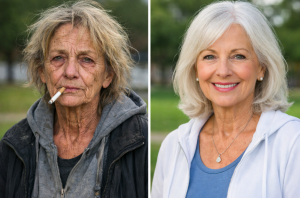“Be the change that you wish to see in the World.”
-Mahatma Gandhi
My ex-girlfriend said, “I feel so sad and pessimistic about the World. I couldn’t do anything for my mother when she was alive.”
Though she was my ex-girlfriend, we are very good friends now.
As we all know, time is the best teacher in our lives but no regret, lives move on.
I Interrupted her and said, “My friend, can I ask you a question?”
“Question, sure,” she replied.
“How often do you get these feelings of pessimism and sadness? I believe you didn’t have this habit when we were together,” I asked.
She said, “What do you mean “how often”? What kind of question is this?”
Once again I said, “Do you remain pessimistic all the time or few times in a day like early in the morning or late in the evening or most of the week or month or one or two times in a season?”
She paused for a moment and then said,” I guess I remain pessimistic and sad all the time, especially after my mother’s death.”
She felt pessimism, sadness and guilt about her situation, working too hard and not having enough time for her mother.
Guilt, loss of mother, and Alzheimer’s disease
In “Guilt, Shame, and Anxiety” the author Dr. Peter R. Breggin, MD, talks about how to take back our life, get rid of negative emotions, and follow our principles to find happiness.
Dr. Breggin says, “Obeying negative legacy emotions is like feeding wild critters. They will take over and grow in power until we have unmanageable beasts trying to overwhelm us from inside our heads. We need to stop feeding the squirrels in our heads. We can start by refusing to listen or respond to them.”
My friend always felt sad about not being a good enough daughter.
I said, “Can I tell you something?”
She nodded.
“We have to change our focus from what happened to our father or mother or sister or brother to what we can do for all fathers and mothers and sisters and brothers who are alive now.
We have to find a way to connect to help the ailing fathers and mothers, sisters, and brothers who are alive now.
This is the only way to get rid of your sadness and pessimism,” I said.
When my friend was a child, her mother was everything for her.
When her mother died, her mother didn’t know who she was.
Her mother died by her side with a disease called Alzheimer’s.
“I will never forget this moment in my life when my mother died in my arms without knowing that I was her daughter,” my friend said.
Alzheimer’s disease is the dominant form of dementia.
There are at least 50 million people suffering from it worldwide and at least 6 million only in the USA.
This touches roughly 10 percent people over 65 and more than 33 percent over 85 and up.
This disease kills more Americans than breast and prostate cancer combined.
By the way, a bit of science behind Alsheimer’s disease.
It is a serious plumbing problem in our brain.
We suffer from neuroinflammation and that leads to loss of brain function.
When the aging brain is unable to drain away the unnecessary protein that accumulates over time, billions of neurons die.
The neuroinflammation fuels the build up of two very specific proteins that cause plaque in the brain, amyloid and tau.
The cerebral cortex of our brain which is a center to our awareness, memory, language, and consciousness become non-functional.
Dr. Rudy Tanzi, PhD, a key expert for Alzheimer’s disease and professor of Neurology at Harvard University says, “we have to make a few things a habit to reduce the risk of Alzheimer’s.
First, we need enough sleep which is mental floss that clears out amyloid naturally from the brain.
Second, we need social interaction that cuts Alzheimer’s risk by twofold especially when we enter adulthood.
Third, we have to control the stress which releases cortisol chemicals that cause neuroinflammation and kills neurons.”
Quality of life and sharing intimate emotions
Good health is our foundation, no question about it.
My friend was physically healthy and active but she was still missing the quality of life.
Our quality of life is based on healthy mind, healthy thinking, and our perception about it.
Quality of life means stopping whining, worrying, complaining, and regretting.
It is spending quality time with family and quality friends, one more time quality friends. We have to know the difference between friends and quality friends.
Quality life means giving, connecting, and sharing our honest and intimate emotions.
Just think about when you can not share your intimate emotions with your dying parents as a son or daughter, what does it feel like?
My friend was carrying the same emotions all her life.
But the truth is, we don’t know how many days we have left in front of us but we absolutely know how to use the remaining days, which are under our control.
The quality of our life is the quality of our everyday emotions.
It’s good to occasionally focus on what we missed but we shouldn’t make it a habitual thing.
If we always focus on what we don’t have, we never sustain happiness and quality in life.
Tony Robbins, a motivational speaker and author of “Life Force” says “We don’t experience life, we all experience what we focus on and the meaning we give to it, so we have to be very selective how we operate daily.”
Happy life, optimism, and future
My dear friend,
We had a very memorable past and we are quality friends now so today I would like to take you on a journey back to history.
Probably, it will help you as well as others why we should be optimistic and happy in life moving forward.
In the time of early hominids, one million years ago, our ancestors would enter puberty at age of 12 or 13 and by the time they were 28, they were already grandparents.
The average age of early humans was only 28 years old.
In the middle ages, the average human lifespan was 35.
In 1900, the average lifespan was mid-40s.
Today, we are touching 80.
This is one snapshot of our life that tells why we should be optimistic and happy.
Let’s take another small picture of human life.
In 1347, we had the most fatal pandemic, bubonic plague, that killed around 200 million people.
Nobody found a cure of bubonic plague.
There was another pandemic in 1918, Spanish Flu, that killed at least 50 million people worldwide.
This virus is still around so we take an annual flu shot every year.
Recently, COVID-19 happened and hundreds of thousands people died but we discovered a vaccine for it in 12 months so that many of us survived.
Many advanced technologies like mRNA vaccines, high speed data connectivity, supercomputers helped to design, test, and distribute COVID-19 vaccines worldwide so that we controlled the loss of COVID-19 pretty quickly.
For this progress, big technology companies like Amazon, ZOOM, Google helped tremendously.
I remember, a few years ago, I would go to the library to find books, journals, or any literature. Today, I use Google.
Not only that, today, everyday, people around the world search on Google 5.5 billion times. These technology applications are a part of our daily life around the world.
And most importantly, everyday, the use is bigger and bigger.
As a result, the majority of the world searches, shops, chats, banks, and performs many everyday activities online.
Our life has become faster and better.
Technologies have saved our time, money, and made our lives easier and better in many ways.
The amazing thing is that they have made our lives interactive globally.
My friend, this is another reason we should remain optimistic and happy. We are progressing all the time.
One more snapshot regarding our health and well being.
In 1981, we paid half a million dollars for 1 GB hard drive storage.
Today, it costs us 1 cent per GB.
In 1971, Intel’s first computer chip used to cost us $1 per transistors, and there were 2300 transistors.
Today, we have Core i9 and has 7 billion transistors in less than a millionth of a penny each.
Our smart phone now is more powerful than any country’s computational power in the early 90’s on the planet.
We have exponential growth in technology and we are not stopping.
We have 5G mobile service now, but we are not stopping. We are going in 6G soon and that can download 142 hours of Netflix in a second.
This fast technology will be life-changing for the health sector.
We can upload health and exercise data or get help from AI wherever we live in the world.
Just think, at the moment we connect more than 125 devices to the internet per second.
Conclusion
Very soon in future, we will have the ability for real time monitoring of our health from sensors in our body.
Sensor measures everything from blood glucose to blood pressure to micro RNAs that indicate an impending heart attack and the quality of our sleep, diet, and lifestyle.
All of these information will be uploaded to an AI which monitors and advises our exact health status.
My friend, we should not be pessimistic, we should be optimistic all the time, that’s the only reason we are human, and we are here.
This is our opportunity to grow in science, technology, and human health.
As Dr. George Church, professor of Harvard Medical School says “Exponential technology growth is especially effective in biology, which is now an information science.”
He is one of the hard core believers that even we, humans, can reverse our age.
This far we’ve come now.
There is already precedent for it.
Dr. David Sinclair, PhD, Harvard professor and author of “Lifespan” says “there is a backup copy of youthful information in the cell that we can access which gives us the ability to reboot cells.”
The crux of this discovery is if we can do this in mouse cells, then we can do this in humans.
There is a possibility that we can reverse our age.
I’m just reminding you, my friend, this is the time to be optimistic and happy.
Let’s not take anything for granted.
When we find a bigger cause in our lives, we heal physically, mentally, emotionally, and spiritually, and that is the ultimate goal of living.
I wish you all the best, my friend.
Yam Timsina, PhD, writes primarily on health basics, scientific progress, social upliftment, and value creation.
Disclaimer: “Please note that some links in this post are affiliate links, which means I may receive a small commission if you make a purchase through them, at no extra cost to you.”





